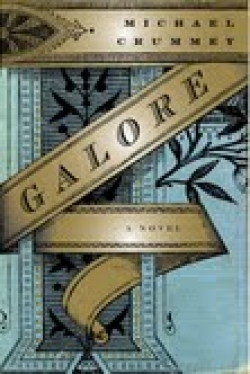Galore
“Time was a single moment endlessly circling on itself…” In a sweeping story of several generations, Galore reveals the lives of the Irish and West Country English in rugged Newfoundland. From the time of Napoleon through the early 1900s, the fishermen and their families work as their ancestors did in the Middle Ages. They construct their own houses (important dwellings that keep out the brutal wind and weather), birth the babies, spin and card wool, and dry the fish in the outside air. They keep the traditions of the churches they erect and attend—Catholic, Episcopalian, and Methodist—but still live in superstition and ignorance.
The coastal dwellers relate their histories from one hundred years ago, during times when “there was fish in galore” as well as desperate periods of hunger, when fishing boats returned empty. They find comfort in remembering the connections and inter-marriages in the confined community. They know the genealogy and everything else about one another, “…the roots of each family so intertwined they were barely distinguishable.”
With an omniscient narrator, Crummey’s story is part folklore, part fairy tale, and an occasional, whimsical interpretation of scripture. He opens by introducing a white-haired, white-faced man who is cut from the belly of a beached whale. Fable or fact, he is named Judah as a combination of two biblical characters. According to one fisherman, it was Judas saved from the whale’s belly, while another argues it was Jonah. They’ve only heard readings from the Bible—a holy book washed up from the sea, some of the pages blurred with water-stain. They never learn the outcome of Abraham having raised his fist to kill his son.
Typical of the author’s talent for inviting the reader in to experience the time and location is the tale of the mummers. In Irish tradition, at Christmastime, the younger adults dress in old clothes, coats turned inside out, faces smeared with coal soot or covered with sacks or handkerchiefs. After dark, they creep up to each house in the area, banging spoons and blowing wooden whistles, shouting in disguised voices. They are always expected and invited in for cake and drinks, while singing songs, dancing about, and generally acting like fools.
The novel sizzles with an edge of the fantastic, as Crummey keeps the action going while circling around to reveal back story. Love without marriage, marriage without love, and also love/marriage successes; ghosts, both friendly and not; feuds; disappointments; mermaids; a magic apple tree; spells; and healings fill their lives. Capturing the speech and temper of a primitive world, and communicating it perfectly, the writer delivers a masterpiece. Galore is the critically acclaimed winner of the Commonwealth Writers’ Prize for Best Book, Caribbean & Canada, and the Canadian Authors Association Literary Award.
Reviewed by
Mary Popham
Disclosure: This article is not an endorsement, but a review. The publisher of this book provided free copies of the book to have their book reviewed by a professional reviewer. No fee was paid by the publisher for this review. Foreword Reviews only recommends books that we love. Foreword Magazine, Inc. is disclosing this in accordance with the Federal Trade Commission’s 16 CFR, Part 255.

